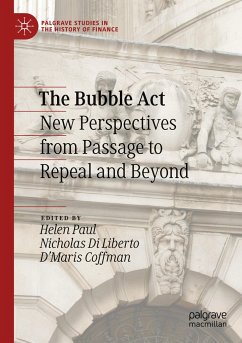
Financing in Europe
Evolution, Coexistence and Complementarity of Lending Practices from the Middle Ages to Modern Times
Herausgegeben: Lorenzini, Marcella; Lorandini, Cinzia
Versandkostenfrei!
Versandfertig in 6-10 Tagen
121,99 €
inkl. MwSt.

PAYBACK Punkte
61 °P sammeln!
This book explores the evolution of credit and financing in Europe from the Middle Ages through to Modern Times. It engages with the distinct political, economic and institutional frameworks of the examined areas (England, Italy, France, Germany, Spain, the Netherlands and Turkey) and discusses how these affected the credit market. It covers a wide range of different types of lending and borrowing instruments, the destination of capital, the way it was raised, and the impact it had on local or national economies in a very long run.Presented in two parts, part one of the book focuses on credit ...
This book explores the evolution of credit and financing in Europe from the Middle Ages through to Modern Times. It engages with the distinct political, economic and institutional frameworks of the examined areas (England, Italy, France, Germany, Spain, the Netherlands and Turkey) and discusses how these affected the credit market. It covers a wide range of different types of lending and borrowing instruments, the destination of capital, the way it was raised, and the impact it had on local or national economies in a very long run.
Presented in two parts, part one of the book focuses on credit markets in the preindustrial age, in particular the period before the advent of modern joint stock banks. Part two examines the evolution of credit at the time of the emergence of modern banks. This volume will be of interest to academics and researchers in the field of finance who are interested in the historic evolution of credit and the credit market.
Presented in two parts, part one of the book focuses on credit markets in the preindustrial age, in particular the period before the advent of modern joint stock banks. Part two examines the evolution of credit at the time of the emergence of modern banks. This volume will be of interest to academics and researchers in the field of finance who are interested in the historic evolution of credit and the credit market.












